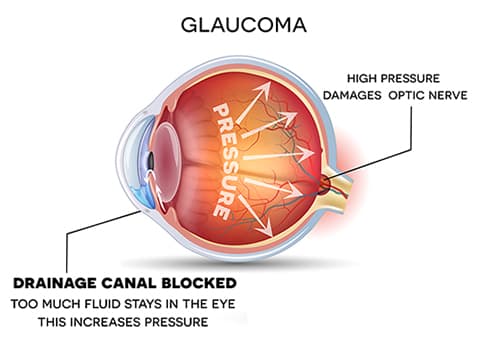 The Silent Thief of Sight: Understanding Glaucoma
The Silent Thief of Sight: Understanding Glaucoma
Glaucoma is a leading cause of blindness in people over forty — yet almost all blindness due to this insidious condition is preventable. Glaucoma is not an infection, nor is it contagious. It is a condition in which pressure created by the fluid in one or both eyes builds to an abnormally high level. Ultimately, this pressure causes damage to the delicate visual structures of the eye and, left untreated, blindness often results.
When does glaucoma occur?
Glaucoma develops when the aqueous humor (normal fluid contained in the front part of the eye) does not drain properly, causing pressure in the eye to rise. Nerve fibers and blood vessels in the optic nerve are compressed and can be damaged or destroyed. As a result, visual messages are not adequately transmitted to the brain, causing impaired vision and, ultimately, blindness.
Types of Glaucoma

By the time vision problems develop, irreversible damage may already have occurred.
A less common form of glaucoma, acute glaucoma, is marked by sudden, severe pain in and around the eye. Vision is sharply decreased, and, in many cases, nausea and vomiting are experienced. Emergency treatment (usually laser or traditional surgery) is required to alleviate the pressure and prevent further damage.
In addition to these two forms of the condition, glaucoma can also occur as a result of inflammation of, or injury to the eye. In rare instances, infants are born with the condition.
Early Detection
Glaucoma can silently steal your vision without warning. Fortunately, there is something you can do to protect your eyesight. Especially if you are over forty, it is critical to have regular eye examinations. Because chronic glaucoma seldom causes symptoms, early detection and treatment are the only ways to prevent permanent loss of vision.
During your eye examination, inform your physician if other members of your family have glaucoma. This is extremely important because the condition tends to be hereditary. Also, inform your doctor of any medications you are currently taking. After completing the routine exam, specific tests will be conducted to confirm the presence of glaucoma. These tests can identify glaucoma long before the onset of symptoms by measuring the pressure in the eye, checking the side (peripheral) and central vision, and examining the interior structures of the eye.
Treating Glaucoma
If chronic glaucoma is diagnosed, the condition will be closely monitored during regular examinations. The treatment of choice for this form of glaucoma includes eyedrops and oral medication which, if regularly used, are often all that is necessary to control the damaging pressure. In cases where these medications cannot successfully control the pressure, surgery (either laser or traditional) is required.
Acute glaucoma initially affects only one eye and is usually accompanied by painful symptoms, as mentioned above. Immediate medication is administered to temporarily relieve the pressure, followed by appropriate surgery. An attack of acute glaucoma occurring in the other eye is common and can be successfully prevented with laser treatment.
If you have glaucoma, remember to:
- Inform your other health professionals of medication you are taking for glaucoma.
- Keep an emergency identification card in your wallet stating that you are being treated for glaucoma.
- Take extra medication with you when you are away from home.
- Inform your ophthalmologist of any side effects from your medication.
- Encourage adult members of your family to have regular eye checkups.
Guard your sight
You can protect yourself from glaucoma. With regular eye examinations and painless eye pressure checks, glaucoma can be detected early and treatment administered to save your eyesight. Take these simple steps to foil the silent thief of sight!
iStent® Trabecular Micro-Bypass Stent
If you need cataract surgery and you have glaucoma, don’t worry. Frantz EyeCare is proud to introduce the latest advancement in glaucoma patient care, iStent® Trabecular Micro-Bypass stent. The iStent® helps patients reduce or even eliminate the need for prescription eye drops to control their intraocular pressure (IOP).
Xen® Gel Stent
The Xen® Gel Stent is a surgical implant designed to lower high eye pressure in open-angle glaucoma patients where previous surgical treatment has failed and/or medications alone were insufficient. The Xen® Gel stent creates a small channel in the eye to drain fluid and help to lower eye pressure.


 The Silent Thief of Sight: Understanding Glaucoma
The Silent Thief of Sight: Understanding Glaucoma